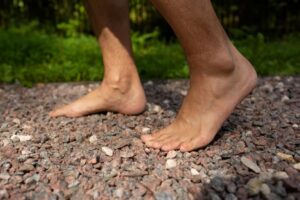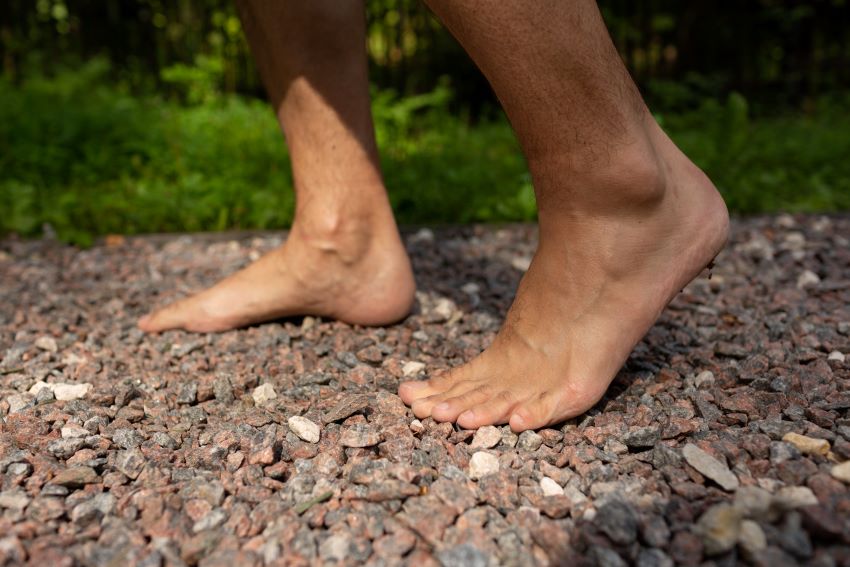Celebrating Men’s Health Month: The Importance of Foot Health for Men
 June marks Men’s Health Month, a crucial time to focus on the unique health challenges men face and promote habits that can lead to longer, healthier lives. While much attention is often given to general fitness, heart health, and mental well-being, foot health is an equally vital component that is frequently overlooked. At West Coast Podiatry, we believe that understanding and maintaining foot health is essential not just for preventing foot-related issues but also for minimizing joint pain and back pain, which are common complaints among men.
June marks Men’s Health Month, a crucial time to focus on the unique health challenges men face and promote habits that can lead to longer, healthier lives. While much attention is often given to general fitness, heart health, and mental well-being, foot health is an equally vital component that is frequently overlooked. At West Coast Podiatry, we believe that understanding and maintaining foot health is essential not just for preventing foot-related issues but also for minimizing joint pain and back pain, which are common complaints among men.
The Importance of Foot Health for Men
Foot health is integral to overall well-being. Men are often more susceptible to specific foot conditions due to their lifestyle, activity levels, and sometimes, neglect of foot care. Conditions like plantar fasciitis, Achilles tendonitis, and bunions can lead to severe discomfort and mobility issues if left untreated. Moreover, poor foot health can contribute to more systemic problems, including knee pain, hip issues, and lower back pain.
A study published in the Journal of Orthopaedic & Sports Physical Therapy highlights that foot and ankle problems can significantly impact gait and posture, which in turn affects the knees and lower back . Proper foot function is critical for alignment and load distribution, reducing the risk of chronic pain and degenerative joint issues.
Common Foot Conditions in Men
Men are prone to several foot conditions, including:
- Plantar Fasciitis: This is an inflammation of the plantar fascia, a thick band of tissue that runs across the bottom of the foot. It often leads to sharp heel pain. According to the American Academy of Orthopaedic Surgeons, plantar fasciitis is one of the most common orthopedic complaints relating to the foot .
- Achilles Tendonitis: Overuse and stress can cause inflammation of the Achilles tendon, leading to pain and stiffness. A review in the British Journal of Sports Medicine indicates that Achilles tendonitis is prevalent in active men, particularly those involved in running and sports that require jumping .
- Bunions: Although more common in women, men can also develop bunions due to genetics or improper footwear. The Mayo Clinic notes that tight, narrow shoes might exacerbate the formation of bunions .
- Gout: This form of arthritis can cause sudden, severe attacks of pain, redness, and tenderness in joints, commonly the big toe. A study in Arthritis & Rheumatology found that men are more likely than women to suffer from gout, partly due to higher levels of uric acid .
- Foot and Ankle Sprains: Men who engage in high-impact sports or physical activities are at a higher risk of sprains and fractures. The National Institute of Arthritis and Musculoskeletal and Skin Diseases highlights that proper warm-up and wearing appropriate gear can prevent many sports-related injuries .
These conditions can lead to a domino effect, impacting other parts of the body. For example, if one is experiencing pain while walking due to plantar fasciitis, they might alter their gait to compensate, which can strain the knees and back.
Preventative Measures
Prevention is always better than cure. Here are some steps men can take to keep their feet healthy and avoid related complications:
- Proper Footwear: Invest in shoes that offer adequate support and cushioning. Avoid shoes that are too tight or too loose. The American Podiatric Medical Association emphasizes the importance of well-fitted shoes to prevent many common foot problems .
- Regular Exercise: Engage in exercises that strengthen the feet and ankles. Stretching exercises, in particular, can improve flexibility and prevent injuries. The Harvard Health Blog recommends specific foot exercises to maintain strength and flexibility .
- Maintain a Healthy Weight: Excess weight puts additional stress on the feet and joints, increasing the risk of pain and injury. The **Centers for Disease Control and Prevention (CDC)** provides guidelines on maintaining a healthy weight to reduce the risk of chronic diseases, including those affecting the feet .
- Good Hygiene: Keep feet clean and dry to prevent fungal infections. Regularly trim toenails and moisturize to avoid cracked heels. The American Podiatric Medical Association advises on proper foot hygiene practices .
- Foot Inspections: Regularly check your feet for any changes, such as cuts, blisters, or swelling, especially if you have conditions like diabetes that can lead to neuropathy. The National Diabetes Education Program stresses the importance of foot care in diabetes management .
Role of West Coast Podiatry
At West Coast Podiatry, we are committed to providing advanced treatment methods to address and prevent foot problems. Our services include:
- Custom Orthotics: Tailor-made orthotic devices can provide the necessary support and alignment, reducing pain and improving function.
- Shockwave Therapy: This non-invasive treatment can be effective for conditions like plantar fasciitis and Achilles tendonitis, promoting healing and reducing pain.
- Comprehensive Diabetic Foot Care: For patients with diabetes, we offer specialized care to prevent complications and maintain foot health.
Advanced Treatment Methods
West Coast Podiatry utilizes state-of-the-art technology and evidence-based practices to deliver superior care. Our advanced diagnostic tools include digital X-rays and ultrasound imaging, which provide detailed views of the foot’s internal structures, enabling accurate diagnoses and targeted treatments.
Additionally, our podiatrists are skilled in the latest surgical techniques. For patients suffering from chronic pain or conditions like plantar fasciitis, we offer innovative treatments such as shockwave and laser therapy.
Conclusion
As we celebrate Men’s Health Month this June, it’s the perfect time for men to take stock of their foot health. Understanding the importance of proper foot care, recognizing the signs of common foot conditions, and seeking timely intervention can significantly enhance quality of life and prevent long-term complications. At West Coast Podiatry, we are here to support you with comprehensive, cutting-edge care tailored to meet your individual needs. Don’t let foot pain hold you back—take the first step towards healthier feet and a healthier life today.
—
References
- Journal of Orthopaedic & Sports Physical Therapy. Foot and Ankle Injuries and Conditions. [JOSPT](https://www.jospt.org/).
- American Academy of Orthopaedic Surgeons. Plantar Fasciitis and Bone Spurs. [AAOS](https://www.aaos.org/).
- British Journal of Sports Medicine. Achilles Tendonitis: Prevention and Treatment. [BJSM](https://bjsm.bmj.com/).
- Mayo Clinic. Bunions: Causes, Symptoms, and Treatment. [Mayo Clinic](https://www.mayoclinic.org/).
- Arthritis & Rheumatology. Gout: Clinical Research and Treatment. [Arthritis & Rheumatology](https://onlinelibrary.wiley.com/journal/23265205).
- National Institute of Arthritis and Musculoskeletal and Skin Diseases. Preventing Sports Injuries. [NIAMS](https://www.niams.nih.gov/).
- American Podiatric Medical Association. Shoe Selection Tips. [APMA](https://www.apma.org/).
- Harvard Health Blog. Exercises for Healthy Feet. [Harvard Health](https://www.health.harvard.edu/).
- Centers for Disease Control and Prevention. Healthy Weight. [CDC](https://www.cdc.gov/).
- American Podiatric Medical Association. Foot Hygiene Practices. [APMA](https://www.apma.org/).
- National Diabetes Education Program. Foot Care for Diabetes. [NDEP](https://www.ndep.nih.gov/).


